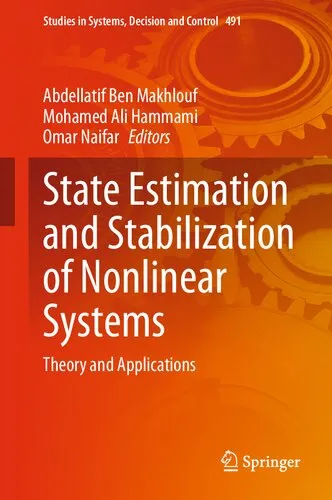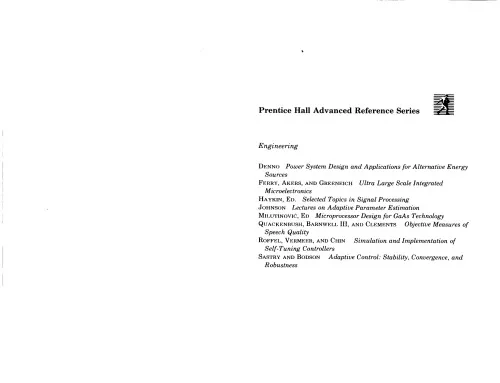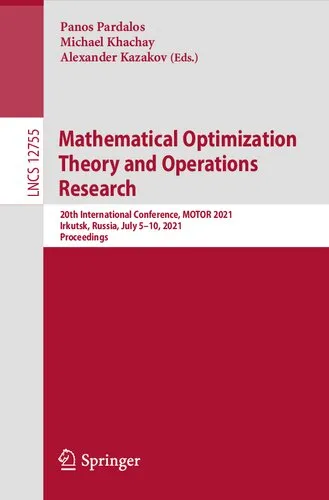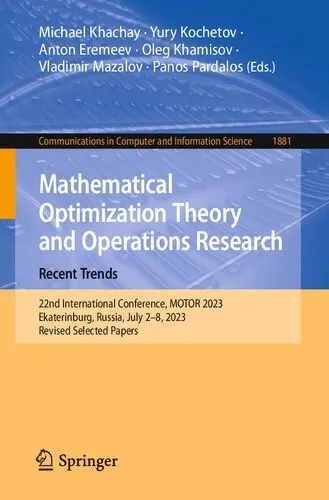Nonlinear model predictive control: Theory and algorithms
4.5
Reviews from our users

You Can Ask your questions from this book's AI after Login
Each download or ask from book AI costs 2 points. To earn more free points, please visit the Points Guide Page and complete some valuable actions.کتاب های مرتبط:
Introduction to "Nonlinear Model Predictive Control: Theory and Algorithms"
"Nonlinear Model Predictive Control: Theory and Algorithms" by Lars Grüne and Jürgen Pannek is a comprehensive and profound guide for understanding the theoretical foundations and computational approaches to nonlinear model predictive control (NMPC). Aimed at both researchers and practitioners, this book provides a structured exposition of the principles, tools, and frameworks that underlie the successful application of NMPC in real-world scenarios. Whether you are a novice exploring NMPC for the first time or an expert seeking deeper insights, this book is an invaluable resource.
At its core, NMPC is a control strategy that deals with dynamic systems described by nonlinear models. Unlike linear techniques, nonlinear control addresses real-world complexities more effectively, making it highly relevant for industries ranging from robotics to energy systems. This book integrates theoretical concepts with algorithm development to provide a holistic view of the topic.
Detailed Summary of the Book
The content of the book is meticulously organized to guide readers from the basics of nonlinear dynamical systems to the development and implementation of advanced NMPC algorithms. The authors focus on three critical aspects: theory, algorithms, and practical applications.
In the theoretical section, readers are introduced to the mathematical formulations and problem structures that form the backbone of NMPC. The book delves into essential topics such as stability, feasibility, and performance guarantees. Clear proofs and illustrative examples are provided throughout to help readers build a strong foundation.
The algorithms section translates the theoretical knowledge into actionable computational techniques. Algorithms such as real-time iteration and methods for handling constraints are detailed with algorithmic pseudocode, making the material accessible for practitioners. Readers are guided on implementing these algorithms in a robust and efficient manner while considering computational limitations.
Finally, the practical applications section bridges the gap between theory and real-world use cases. From control problems in mechanical systems to energy optimization, the book demonstrates how NMPC is applied in various industries. Examples are crafted to show how complex optimization problems are tackled in practice, emphasizing adaptability and ingenuity.
Key Takeaways
- An in-depth understanding of the theoretical principles of nonlinear model predictive control.
- Comprehensive insights into algorithm design and real-time computational strategies.
- Clear explanations of system constraints, optimality, and control objectives.
- Practical tools and examples for implementing NMPC in engineering applications.
- Latest advancements in the field along with a forward-looking perspective on emerging trends in control theory.
Famous Quotes from the Book
"The essence of model predictive control lies in continuously solving optimization problems in real-time, balancing immediate and long-term gains." — Lars Grüne & Jürgen Pannek
"The success of NMPC applications lies not just in mathematical rigor, but equally in the ingenuity of implementation under practical constraints." — Lars Grüne & Jürgen Pannek
Why This Book Matters
With the increasing complexity of systems in modern engineering and science, the need for robust and efficient control strategies is more critical than ever. Linear approaches often fall short in dealing with real-world nonlinearity, motivating the rise of NMPC as a vital tool. This book is a scholarly yet accessible resource, enabling engineers, researchers, and students to navigate the complexities of NMPC.
The book's significance lies in its ability to combine rigorous theory with practical implementation. It does not merely present abstract ideas; instead, it equips readers with actionable knowledge that can be applied to solve real-world problems. As industries continue to innovate and automate, this book provides a solid foundation for addressing tomorrow's challenges in control and optimization.
Ultimately, "Nonlinear Model Predictive Control: Theory and Algorithms" is more than a textbook; it is a roadmap for advancing understanding in a critical area of control engineering, making it an essential reference for professionals and scholars alike.
Free Direct Download
You Can Download this book after Login
Accessing books through legal platforms and public libraries not only supports the rights of authors and publishers but also contributes to the sustainability of reading culture. Before downloading, please take a moment to consider these options.
Find this book on other platforms:
WorldCat helps you find books in libraries worldwide.
See ratings, reviews, and discussions on Goodreads.
Find and buy rare or used books on AbeBooks.
1268
بازدید4.5
امتیاز0
نظر98%
رضایتReviews:
4.5
Based on 0 users review
Questions & Answers
Ask questions about this book or help others by answering
No questions yet. Be the first to ask!















